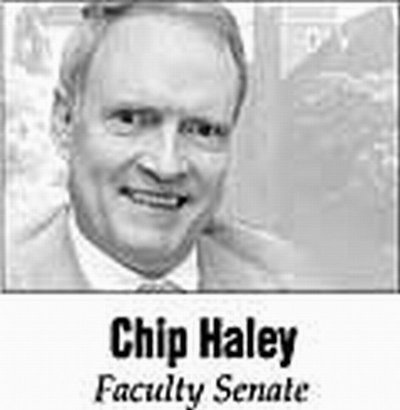November 8, 2001
Council active, with range of issues
The Faculty Council on Faculty Affairs (FCFA) shall be responsible (as described in Section 42-33) for all matters of policy relating to the interests of the faculty, such as appointment, tenure, promotion, professional leave, compensation (including salary and fringe benefits), academic freedom, standards of academic performance, and professional ethics.
– FACULTY CODE Section 42-38
The FCFA looks after the Faculty Code, which is essentially the employment contract for the faculty. The Code covers the overall organization of the faculty, establishment of colleges and schools, tenure and promotion procedures, salary policy, and how to resolve disputes over these issues. It also may be involved in almost anything of concern to the faculty although issues that are not directly within the province of the FCFA are usually passed on to one of the other faculty councils. Much of the work of the FCFA is done in subcommittees drawing their members both from the FCFA, other faculty councils, and groups interested in the issue a subcommittee is dealing with.
The FCFA is very active, meeting every other week throughout the academic year. The range of issues considered and the impact of the FCFA on those issues are substantial. Last year the Senate approved legislation we wrote on the following issues: providing voting rights to research faculty, integrating the Bothell, Seattle, and Tacoma faculty into our system of governance, and setting forth the major principles the faculty feel should be a part of any enabling legislation to allow faculty unionization.
In addition, the FCFA expressed concerns about a proposed new copyright policy which has not yet been implemented, encouraged the Administration to provide more flexibility to departments in implementing the Instructional Responsibility Policy, considered changes to retired faculty voting rights, and discussed problems of commercialization on campus.
Current issues before the council include the status of lecturers and senior lecturers, an evaluation of how some changes made two years ago in Chapter 24 of the Faculty Code are working, and policies regarding unit salary adjustments.
FCFA members are drawn from all faculty groups on campus and include representatives from the administration and the ASUW. Although we have wide representation, for most issues considered we seek additional opinions; for example, when we were drafting last year’s resolution on Enabling Legislation, we invited representatives of the AAUP.
The issues we deal with come from many sources including the Faculty Senate officers, the Senate Executive Committee, the provost’s and president’s offices as well as from individual FCFA members. We are not limited in any way as to which issues we consider, or from what direction they have come. If you have a concern you wish to be considered by FCFA, please contact any FCFA member voting or nonvoting. A list of our membership can be found at http://www.washington.edu/faculty/facsenate/councils/fcfa/2000fcfa.htm. Once an issue is decided it is usually assigned to a subcommittee where much of the real work of the FCFA is done.
If you would like to learn the real meaning of shared governance, at the University of Washington, then consider volunteering for the FCFA. The University is not a democracy – the president has veto power over every piece of Class A or B legislation passed by the Senate. However, the Faculty Senate has achieved a powerful position in the governance of this tri-campus University through collegial consideration of issues affecting the UW. The President cannot operate without the advice and consent of the faculty. Over the years we have developed a set of policies to guide the operation of the UW. The development of the policies that directly affect the faculty is the part of shared governance addressed by the Faculty Council on Faculty Affairs.
Chip Haley is the chair of the Faculty Council on Faculty Affairs.



